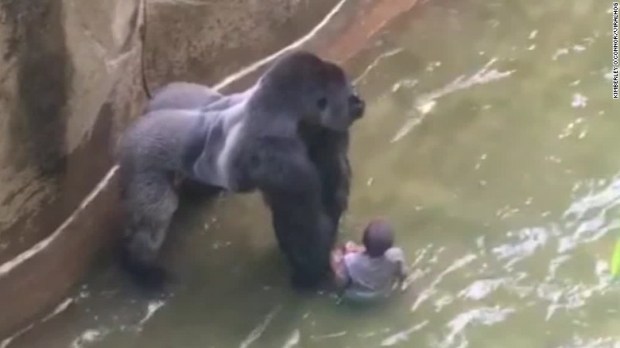While serving as a policeman in Burma, then part of the British Raj, young George Orwell was obliged to kill a tame elephant that had escaped from its owner and killed an Indian day-laborer during a temporary musth attack. His younger colleagues “said it was a damn shame to shoot an elephant for killing a coolie, because an elephant was worth more than any damn Coringhee coolie.” Recounting the episode in a famous essay, Orwell cites the judgment without comment, trusting us to recognize it as a sign of the rot that colonizes the souls of colonizers.
Unapologetic imperialism may be a thing of the past, but that type of cost-benefit analysis is alive and well. After zoo workers in Cincinnati killed a gorilla in the hope of protecting a four-year-old boy who’d broken into his habitat, plenty of people have declared for the record that the wrong life was given priority. “7 billion humans on this planet, & the critically endangered #gorilla is the one killed?” tweeted one concerned citizen.
In First Things, Wesley J. Smith does an excellent job of summarizing the arguments for ending “human exceptionalism,” i.e., erasing social and legal distinctions between ourselves and animals. The brazenness of the gorilla-first camp suggests such notions are trickling down from the academy and seeping into the general culture. For a Christian, the progression is all too predictable: With God, who created mankind alone in His image, stricken from the equation, we’re hard pressed to name what inherent value any of us has that a gorilla – especially an endangered western lowland gorilla – might lack. If our only concern is meeting some quota, then, yes, we might as well install a preferential option for the apes.
Twenty years ago, St. John Paul II warned that any culture given to assigning human life a priority value or a price tag would end up creating a tyranny of the strong over the weak. In his encyclical Evangelium Vitae, he wrote that, in such a culture, “A person who, because of a handicap or, more simply, just by existing, compromises the well-being or life-style of those who are more favored tends to be looked upon as an enemy to be resisted or eliminated.” And he named this culture for the ages: The culture of death.
The tragic part is that animal-rights activists would avow themselves the enemies of any culture of death. By their own lights, after all, they’re fighting the exploitation of a voiceless, largely powerless population. But the most extreme forms of advocacy for the slain gorilla illustrate what happens when justice is pursued without any notion of transcendent human value. Nothing remains to prevent our swapping a sometimes harsh pecking order for an absurd one, and talking in terms that would resonate with the imperialists of Orwell’s day.
In a recent New Yorker article, Nathan Heller describes a meeting with Cyrus Eosphoros, who dropped out of Oberlin citing “persistent, low-grade dehumanization” from the faculty. A trans man, Eophoros has been diagnosed with various mental illnesses, but Heller insists that many less-afflicted Oberlin students are his “fluent fellow-travelers” in malaise. Apparently, analyzing power relationships to a turn, a specialty at liberal-arts schools like Oberlin, does nothing to make students happier or more confident.
I suspect Eosphoros’ offhand phrase contains the reason why. Today’s students have no sense that being alive and human should be valuable in its own right. With the social sciences teaching them that these qualities carry no weight in fact, students are reduced, even in their own minds, to places on a totem pole. Small wonder they’re turning out to be so skittish over slights to the various facets of their identities. When it comes to their dignity, they imagine themselves gambling constantly with the rent money.
With no buffering sense of the sacred, creating a perfect meritocracy will likelier raise the stakes (and the angst) than lower them. George Bernard Shaw once suggested that people be obliged to justify their existence before a board once every few years. Those who failed to produce as much as they consumed would be told: “Your life does not benefit us and it can’t be of very much use to yourself.”
God help us, but the future might look just like that, with some slack cut for silverbacks.
[Editor’s Note: Take the Poll – Was the Gorilla Shooting at Cincinnatti Zoo Justified?]

